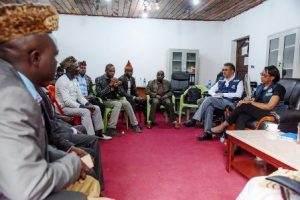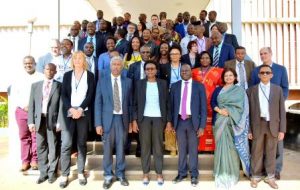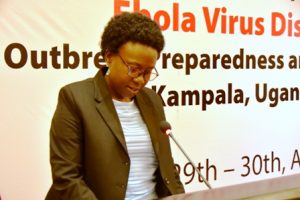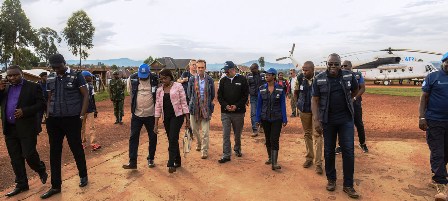Ebola situation worsening, WHO high-level mission to Butembo, DRC raises alarm
-
International Partners’ Meeting to discuss preparedness and response ends in Uganda

A WHO high-level mission led by Director-General Dr Tedros Adhanom Ghebreyesus and WHO Regional Director for Africa, Dr Matshidiso Moeti, yesterday ended a visit to Butembo, in the Democratic Republic of the Congo, raising the alarm that the Ebola situation in the country is worsening.
It was in Butembo on 19 April that WHO epidemiologist Dr Richard Mouzoko was killed and two other colleagues injured by armed men while they were working on the Ebola response.
Dr Tedros and Dr Moeti traveled to Butembo to express their gratitude and show support to WHO and partner organization staff, while also assessing the next steps needed to strengthen both security and the Ebola response effort. They also met with local political, business and religious leaders, and called on them to accelerate their efforts to stabilize the surrounding environment.
They urged the international community to step up support to contain the Ebola outbreak, including filling the funding gap that threatens to stymie the Ebola response.
Most Ebola response activities, including community engagement, vaccination, and case investigation, have been re-launched following a slowdown in the wake of the attack that left Dr. Mouzoko dead and two people injured. However, they expressed deep concern that a rise in reported cases in recent weeks is straining resources even further.
“My pride and respect for my extraordinary colleagues has only grown,” said Dr Moeti. “They have been through something unimaginable and yet are willing to continue this vital work. We need the security situation to be under control for them and for the local people. During our mission, we had fruitful discussions with the partners who provide security cover to see what more could be done. Meanwhile, we will continue to work with various groups and embed our response at the community level.”
The delegation met the Mayor of Butembo, Sylvain Kanyamanda Mbusa, the US Ambassador, Michael A. Hammer, the Deputy Special Representative of the peacekeeping mission to the DRC (MONUSCO), David Gressly, and other UN partners, business, religious and political leaders, and NGOs active in the response.
“We are entering a phase where we will need major shifts in the response,” said Dr Tedros. WHO and partners cannot tackle these challenges without the international community stepping in to fill the sizeable funding gap.”
Only half of the currently requested funds have been received, which could lead to WHO and partners rolling back some activities precisely when they are most needed.
“We will continue to adjust the response, as we have done for each context in each community,” said Dr Moeti. “This worrisome rise in cases is a further call to action. In the end, it is only through the ownership by all the affected communities that the outbreak will end. Some would have Ebola drive us apart. We can only defeat it if we all work together.”

WHO-AFRO
Meanwhile, delegates at a two-day International Partners meeting convened by the World Health Organisation Africa Region, which ended in Kampala, Uganda yesterday, have made recommendations that will inform the preparation of a road map on EVD preparedness and response in the region.
As the EVD outbreak continues to escalate in the Democratic Republic (DRC), public health workers across the region are realizing that if the outbreak is not contained in DRC, it is probably a matter of time before it spreads to neighbouring countries.
The delegates from nine neighbouring countries therefore called for increased investment in community engagement through existing community structures. This, they observed, is vital because disease outbreaks primarily occur and affect communities, they are the first points of contact and know the norms and practices that usually drive the spread of infections. Besides, community resistance, hostility and stigma such as those witnessed in a few instances in DRC can be effectively tackled through community engagement.
The delegates also looked at disease surveillance in the region and recommended that this be strengthened within the existing health system and community-based structures. They emphasized the importance of resource mobilization which they agreed should be done transparently focusing on priorities and needs identified by countries in their preparedness and response plans.
The delegates agreed that cross-border collaboration is critical in disease outbreaks especially because of the inter-linkages and social-economic activities that bring people together. Such consideration, activities and structures should be used to contribute to disease outbreak efforts such as surveillance.
The delegates particularly noted the critical role of regional economic bodies such as the East Africa Community that can be used to harness political and financial contribution to disease outbreaks right from the highest offices in countries and also facilitate cross-border collaboration.
“We have held meetings with DRC, visited their facilities and shared experiences on how to better manage this outbreak. Therefore, cross border collaboration is an important measure during any disease outbreak,” said the WHO Representative in Uganda, Dr Yonas Tegegn Woldemariam while emphasising the need for cross-border collaboration at the closing ceremony.
Closing the two-day meeting, the Uganda’s Minister of Health Dr Jane Ruth Aceng lauded international partners for supporting the Democratic Republic of Congo (DRC) battle the current Ebola Virus Disease (EVD) outbreak and the neighbouring countries in their preparedness and readiness phase.
“The outbreak in DRC affects everyone and while we have no confirmed cases in the neighbouring countries, preparation is paramount. I thank the partners for their support in both response and preparedness modes during this EVD outbreak,” she said.

While appreciating the various interventions that have been implemented to control the outbreak in DRC and prevent spread to other countries, Dr Aceng singled out vaccination of health workers, cross border collaboration and awareness creation as interventions that have helped Uganda and other countries stay EVD-free up to now.
“Vaccination has been a major breakthrough in the management of Ebola. Many lives have been saved and spread averted because of vaccination of frontline health workers and people in affected communities” she observed.
Dr Aceng reported the excellent collaboration between health workers in Uganda and DRC that has enabled the identification and follow-up of several people suspected to be EVD contacts. “The colleagues in DRC have alerted us several times about suspected contacts who we have followed and handled appropriately,” she said.
Awareness creation has also contributed tremendously to prevent the spread of EVD within DRC and to other countries. “Awareness creation should continue in all communities so that out people remain alert,” said Dr Aceng.
However, Dr Aceng also proposed two issues which she strongly urged international partners to always adhere to in order to ensure effective and sustainable response not only to EVD but also other disease outbreaks in Africa.
“First always ensure transparency and accountability in all actions and in what you do on the ground. Share what you are doing based on the funds given because it not only helps to avoid duplication of work but also builds donor and community confidence,” she said adding that this will contribute to building strong and resilient health systems in Africa.
“Secondly, I urge you to always ensure country leadership and ownership in your work. Let country authorities be in charge of and lead preparedness and response activities because they know the countries better than you. Please don’t impose, instead, work with us and support us within the national government structures” she said.

